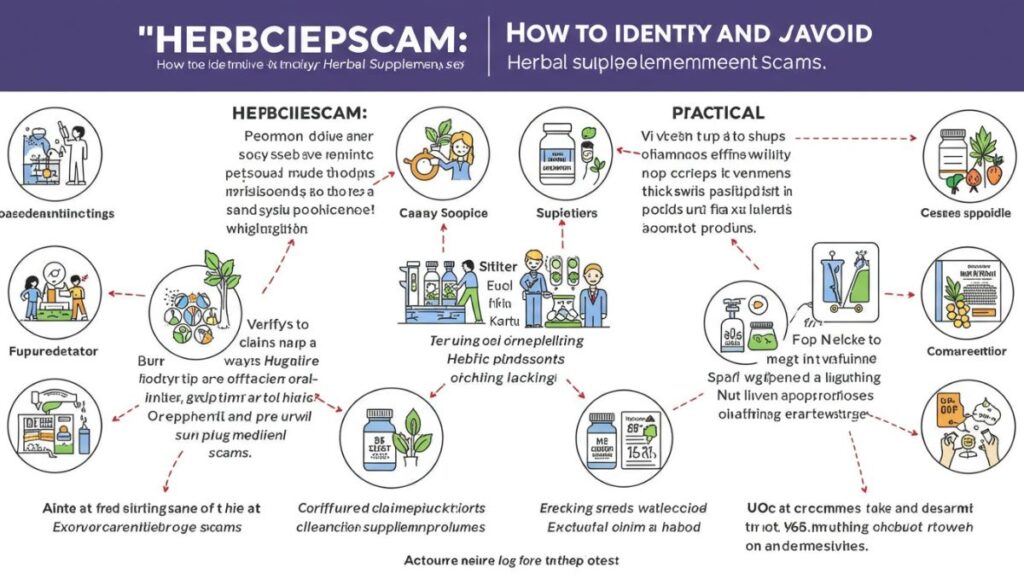Herbal supplements and natural remedies have become increasingly popular over the last decade. From weight loss teas to “miracle cures” for chronic diseases, the internet is flooded with products claiming to deliver fast results with little effort. Unfortunately, not all of these claims are true.
Herbciepscam is a term that reflects growing concerns about fake herbal products, deceptive marketing, and online scams in the supplement industry. While many herbal products are safe and effective when sourced from legitimate brands, others can be misleading, unsafe, or outright fraudulent.
This article explores the world of herbal supplement scams, how to recognize them, and how to protect yourself as a consumer.
What is “Herbciepscam”?
The phrase herbciepscam is not a brand itself but rather a way to describe herbal scams circulating online. These can take many forms, including:
-
Fake websites selling counterfeit herbal products.
-
Overpriced supplements with exaggerated claims.
-
Subscription traps that charge hidden monthly fees.
-
Dangerous products marketed as “all natural” but containing harmful chemicals.
In short, herbciepscam represents the risks and deceptions tied to the unregulated herbal supplement market.
Why Herbal Scams Are on the Rise
Several factors have made herbal supplement scams more common:
1. Increasing Demand for Natural Remedies
As more people turn away from synthetic medicine, the demand for natural health products has skyrocketed. Scammers exploit this growing market.
2. Limited Regulation
Unlike pharmaceutical drugs, many herbal supplements do not go through strict testing or regulatory approval before reaching the market.
3. Online Sales Boom
The rise of e-commerce makes it easy for fraudsters to set up convincing websites and sell fake products.
4. Misleading Marketing
Phrases like “100% natural,” “clinically proven,” or “miracle cure” are often used without scientific backing.
Common Types of Herbal Supplement Scams
1. Fake Herbal Cures
Websites often claim that their herbal product can cure serious illnesses like cancer, diabetes, or heart disease. Such claims are not only false but also dangerous.
2. Weight Loss & Detox Scams
From slimming teas to detox capsules, many herbal scams promise rapid weight loss or body cleansing with little evidence.
3. Subscription Traps
Some sites offer a “free trial” but hide the fact that users will be automatically billed monthly at high prices.
4. Counterfeit Products
Fraudsters may package and sell fake pills or powders that contain little to no active herbal ingredients.
5. Hidden Chemicals
Some “herbal” products secretly contain pharmaceutical drugs or harmful substances to make them appear effective.
Warning Signs of a Herbciepscam
To protect yourself, watch out for these red flags:
-
Unrealistic promises: “Lose 10kg in 7 days” or “Cures cancer naturally.”
-
Lack of transparency: No ingredient list, no clear company details, or fake reviews.
-
Aggressive marketing: Pop-up ads, countdown timers, and limited-time offers.
-
No third-party testing: Legitimate brands usually provide lab reports.
-
Unverified health claims: No links to scientific studies or clinical trials.
Real Risks of Herbal Scams
Falling for a herbciepscam doesn’t just hurt your wallet—it can endanger your health. Risks include:
-
Wasted money on ineffective products.
-
Delayed treatment if patients rely on fake herbal cures instead of real medicine.
-
Health complications from unsafe ingredients.
-
Identity theft or fraud if scammers misuse payment details.
How to Protect Yourself from Herbal Scams
1. Research the Brand
Check reviews, company history, and customer feedback. Avoid websites with little or no online presence.
2. Verify Ingredients
Look for clear ingredient lists and cross-check them with trusted medical or herbal references.
3. Look for Certifications
Reputable products often have certifications like GMP (Good Manufacturing Practices) or third-party lab testing.
4. Avoid Unrealistic Claims
No herbal product can guarantee instant weight loss, cancer cures, or miracle results.
5. Buy from Trusted Sources
Stick to pharmacies, reputable e-commerce platforms, or official brand websites.
The Role of Regulation in Preventing Herbciepscams
One major reason scams thrive is the lack of global regulations. While agencies like the FDA (Food and Drug Administration) in the U.S. and the MHRA (Medicines and Healthcare products Regulatory Agency) in the UK monitor safety, many herbal supplements bypass strict testing.
Improving consumer education and demanding better transparency from companies is essential to fight herbciepscams.
Safer Alternatives to Risky Herbal Products
Instead of falling for scams, consider safer approaches to herbal medicine:
-
Consult a qualified herbalist or naturopath for professional guidance.
-
Use herbs with proven benefits, such as ginger for digestion or chamomile for relaxation.
-
Buy from well-known, certified herbal brands with good reputations.
-
Combine herbal remedies with medical advice instead of replacing treatment entirely.
The Future of Herbal Supplements: Trust Through Transparency
While scams exist, the herbal industry itself is not inherently bad. Many herbs have genuine therapeutic benefits backed by science. The future lies in:
-
Stronger regulation of online supplement sales.
-
Blockchain tracking to ensure authenticity of products.
-
Greater consumer education on safe use of herbal medicine.
-
Partnerships between science and tradition for evidence-based herbal remedies.
Conclusion
The rise of digital commerce has made herbal products more accessible—but it has also opened the door for scams. Herbciepscam serves as a warning for consumers to stay alert, question bold claims, and avoid falling for fraudulent products.
By learning how to spot red flags, verifying brands, and choosing trusted sources, you can enjoy the benefits of herbal medicine while protecting yourself from risks.
In the end, herbs can support health—but only when used responsibly, ethically, and safely. Stay informed, stay cautious, and don’t let a herbciepscam compromise your well-being.






